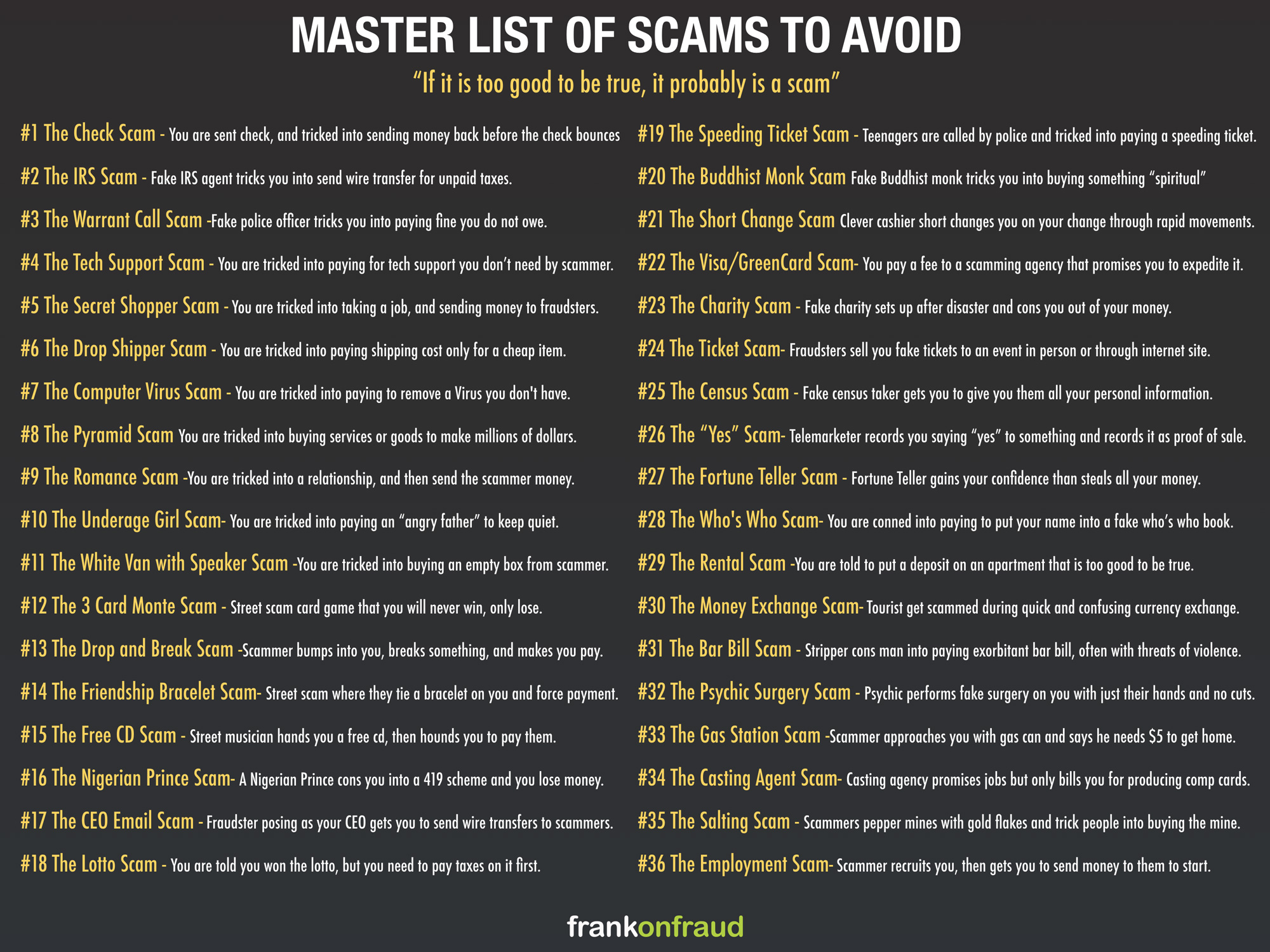There are lots of ways to get ripped off out there. And now more than ever, it’s important to be vigilant of all the clever ways fraudsters can steal your money. I have been scammed a dozen times in my life (probably more) and that is because I was confused at the time and wanted to believe the best. I wrote this blog to help people understand what they can do to stop being scammed. Knowledge is power.
The Scams May Change, The End Result is Always The Same
Every scamster has 1 goal and that is to take your money or take something of value from you. Scammers will always talk fast, be too friendly, and always try to confuse you. By doing this, they increase their odds of getting your money. Remember no matter how confused you are, all scams end with you giving something valuable to the scammer.
Remember no matter how confused you are, all scams end with you giving something valuable to the scammer.
If you want to avoid scams always remember 4 things:
- If someone is asking you for money or to give them something – Stop and Wait.
- If you are interested, tell them you will think about it. Scammers never want to wait.
- Research everything before you send anyone money. Knowledge is power.
- Ask a friend or family member for their opinion. Reach out for help.
Learn how to protect yourself by reading up on the top 20 scams that you need to be on the look out for. Read up these scams. Some of you may have already fell victim to one or several of these.
#1 – The Fake Check Scam
The fake check scam is the most common of all scams out there. There are many variations of it but it happens most often when you are selling something on Craigslist, eBay, or Facebook. It also is very common when you are hunting for an apartment, or when you are applying for a job online.
How the Scam Works
The Scammer Sends You Check – The scammer sends you a check, it’s often for more than you asked for and tells you to deposit it into your checking account.
You Deposit the Check And It Looks Like it Clears – After a couple of days the funds look like the clear (the bank has to clear it by law). You think the check is good and you are lulled into a false sense of security and trust in the scammer.
The Scammer Ask for Some Money Back – Having gained your trust, the scammer will inevitably create a complex story of why they need some of the money back and request you send gift cards, money orders, wire transfers or cashiers check to someone they know. The money and gift cards you send are often going to money mules that collect the money for the scammers.
The Check Bounces – You then receive a notice from your bank that the check has bounced, and your account is in overdrawn status because you sent out all the funds back to the fraudster.
You are Held Responsible for Repaying The Money By the Bank – To the bank, you may be a victim of the scam, but they don’t get care. They want their money back and they hold you responsible and force you to pay back any money that your account is overdrawn.
How to avoid it
Avoid taking a check from anyone online even if they say it’s a cashiers check. And more importantly, never send money back to someone after they send you a check.
# 2 The IRS Scam
This is one of the fastest rising scams. In this scam, fraudsters try to take advantage of the fear factor to get you to wire them money or send gift cards.
How the Scam Works
You Get a Robo Call – Scammers automatically dial your number and leave a pre-recorded message that say’s something like, “This is Agent Tom Smith from the IRS. There is a warrant for your arrest. Please call (312) 645-XX23 (a phone number where they are located). These calls usually are coming from Pakistan or India from large call centers.
When you Call Back, They Tell You You Owe Back Taxes – After calling back, the purported IRS agent (who usually has a very thick accent) informs you that they audited your taxes from 2 years ago and you made an error. They tell you that you owe $3500 or some amount between $2,000 and $5,000 usually.
They Tell You To Pay to Avoid Arrest – After they have scared you enough, they tell you, you can avoid arrest by paying the money through their special service. They usually request Itunes Gift Cards, GreenDot, or even Western Union payments.
How to Avoid It
Get a service on your phone like ATT Call Protect that will automatically block fraud calls. If you do get a message, ignore it and never call back.
# 3 – The Warrant Call Scam
This is a very similar scam to the IRS Tax Scam, however, scammers will advise they are a law enforcement officer, an agent, a sheriff or police officer. They advise that there is a warrant out for your arrest for some bogus infraction like “missing jury duty”.
They advise you to pay the fine and very often get you to send them gift cards.
How to Avoid It
Don’t return calls regarding a “warrant”, if you do, never send gift cards to a law enforcement officer.
#4 – The Tech Support Scam
The Tech Support scam usually starts with a Robo call out of India or Pakistan to your phone number. But they can also originate with a pop-up message on your computer or an email. In the message, they tell you that you have a virus on your computer and that you need to call “Microsoft Tech Support” to help you remove it.
When you call back, they initiate their scam which can involve many steps.
How it works When You Call Back
According to the FTC this is what happens to most people in these scams
- Remote Access – the fraudsters ask you to give them remote access to your computer – which lets them change your computer settings so your computer is vulnerable to attack
- Malware Install – They trick you into installing malware that gives them access to your computer and sensitive data, like user names and passwords
- The Software Sale – They try to sell you software that’s worthless, or that you could get elsewhere for free
- Service Programs – They try to enroll you in a worthless computer maintenance or warranty program
- Get your Credit Card – They ask for credit card information so they can bill you for phony services, or services you could get elsewhere for free
How to Avoid It
Install a service like ATTCall protect to block the calls to begin with. Never give someone online remote access to your computer unless you know the person or they work for your company or an approved vendor
#5 – The Secret Shopper Scam
The secret shopper scam has been around for years but is booming again. A USA Today article, recently outlined how the scam works.
How it Works
- Advertisement -You will get an email or see a craiglist advertisement that says something like, “Urgent, Secret Shoppers Needed for Walmart. You will be paid $350 per assignment to pretend like you are a real customer and then report your experience back.
- The Hook – Once you call back they hook you and sign you up to become a secret shopper.
- The Big Check – 1 or 2 days later you will get a big check for you to “Buy Gift Cards” that can be used for your assignments. These are often GreenDot cards. The big check will often be $2,000 to $3,000.
- Return the Money or Gift Cards – After you have bought the gift cards the scammers instruct you to return the gift cards to them for other assignments or to wire transfer money back to them. They will often claim they made a mistake and need you to do that to keep your job
- The Check Bounces – Days later the check bounces and you are in overdraft.
How to Prevent It
Secret Shopping companies only take applications for their programs on their websites they do not send out emails or advertisements. Only do secret shopping if you are applying not if you are receiving a solicitation from somone you do not know.
# 6 – The Drop Shipping Scam
The Drop Shipping scam is another scam that has originated online. Often you will see a pop-up ad or listing on Ebay that has an item listed as close to free. They only require you to pay shipping.
What happens in this scam is that you end up paying a very high dollar amount $10 to $15 dollars for something that is coming out of China. The item is typically worth about $3 and the seller already has the shipping paid by the Chinese government.
You have just been scammed by paying way overprice for a horrible item.
#7 – The Computer Virus Scam
This scam gets you to buy something, or worse yet, install something on your computer like malware.
How it Works
- Popup appears – A pop-up appears on your computer saying “Warning, You have a Virus!”. It may even cause your computer to make a horrible screeching sound or a loud beep. It warns you to scan your computer.
- The Pitch – When you clock “Ok”, your computer is routed to site that performs a phony scan and offers to clean your computer, or offers you Virus protection to help you keep your computer safe.
- The Hook – If you continue, you will likely be required to buy expensive virus protection software (which never works or causes more problems), or you will inadvertently order malware which can steal your passwords and logins.
How to Avoid It?
Don’t ever click on the links that pop-up. Install a firewall on your computer that prevents these pop-ups in the first place.
#8 – The Pyramid Multi-Level Marketing Scam
Rather than recruiting you to sell a good or a service, a pyramid scam cons you into buying a product, and then recruiting others to do the same. A Multi-level Marketing (MLM) company is just a clever name for a company that does basically the same thing. You can always tell an MLM scam because they will always make you buy a product (and lots of it), to buy into the company.
There are literally thousands of these scams on the internet today. With social media, the number of companies conning consumers has increased exponentially. The promise to “work at home” in your free time and potentially make millions of dollars a year is the pitch that suckers in hundreds of thousands of victims each and every year.
Remember the FTC estimates that 99% of people lose money in Multi Level Marketing Companies. Avoid them at all cost.
How it works
The Approach – You might be approached at a coffee shop, or you might have a friend of a friend on Facebook advise you of a great opportunity to make money part time.
Selling the Dream – When you look at the Facebook page of the person pitching you, they make it look like they are millionaires. They might have pictures traveling all over the world, or pictures in front of yachts, boats and expensive cars. The only thing is those pictures are often setup. Multi-Level Marketing programs instruct people to make it look like they have “made it” to convince people they are successful.
The Con – Once you are hooked, you will be asked to buy training programs, herbal supplements, makeup or some other product as part of the program. The only problem is that you cannot really make any money selling those products. The only way for you to make money is to con someone else into joining and buying product.
How to Avoid It?
If it is too good to be true, it often is. Avoid taking any job where you have to buy something or pay a fee before making any money
#9 – The Romance Scam
A romance scam is a confidence trick involving feigned romantic intentions towards a victim, gaining their affection, and then using that goodwill to commit fraud.
Romance scams are one of the fastest growing types of fraud and the scammers are usually based overseas.
How it Works
- Online Dating Profile – The victim is usually on a dating site, Match.com, Plenty of Fish where they hope to meet someone.
- Scammer Sets up Fake Profile – Scammers will setup fake profiles with fake pictures and identities. They may often pose as well respected people, military or other people that you would otherwise trust.
- Scammer Builds Trust – Scammers will often lure the victim over many months and show lots of love and support for the victim through emails, text and even calls.
- Scammer Has an Emergency – Once the scammer has their victim hooked, they will make up stories of family emergencies where they need money. The stories may be outlandish but meant to pull at the victim’s heart strings.
- Scammer Escalates – As the scam escalates, the scammer will push for more and more from the victim, asking for suggestive pictures they may use later for extortion, asking for help laundering money, soliciting the victim to become a money mule or worse.
How to Avoid It.
For the most part, do not trust love interest overseas. 99% of online romance scams will originate from overseas.
#10 – The Underage Girl Scam
The Underage Girl Scam is relatively new. In this scam, unsuspecting guys are extorted by a “pissed off father”.
How it Works
- Cute Younger Girl – A guy meets a cute girl online. They hit it off. But the online profile of the girl is fake and often made using stolen pictures off the internet of another girl.
- The Exchange – Over the next few days the girl flirts with the guy and gets him to send suggestive pictures to him. She does the same and sends him pictures.
- The Angry Father – Suddenly the guy begins to receive very angry text from someone claiming to be the girl’s father. He claims that the girl is underage and that he is going to report the guy to the police.
- The Extortion – The father demands that the guy sends wire transfers (often several of them) to keep him from going to the police and to keep the whole thing quiet. The extortion may not stop and the father may demand more and more money.
How to Avoid It
Be very careful of who you communicate online. If it seems to good to be true. Avoid it.
#11 – White Van with Speaker Scam
The White Van with Speaker scam has been around for over 30 years and still claiming victims.
How it Works
- Scammer approaches – Scammer drives up in a van and asks you if you are interested in buying something TV or IPAD, or expensive electronics. The story is that they “work for a place” and these were extra. They try to play into your greed factor by alluding to the fact the goods might be illicitly obtained.
- Scammer shows you boxes – the scammer opens the rear door and shows you boxes of TV’s or IPADS stacked up. They even open one box and seemingly show you the product. It all looks great.
- You Buy One – Once you have been suckered you end up paying cash and you get a brand new unopened box with the electronics.
- You open the Box – Once the scammer leaves, you open the box and find out you have been ripped off. They often use bricks, or a piece of metal to give the box weight and they may even use a false front of the product which you later discover.
How to avoid it?
Don’t buy anything out of the back of a van dummy.
#12 – The 3 Card Monte Scam
Three-card Monte – also known as “find the lady” and three-card trick – is a confidence game in which the victim, or “mark”, is tricked into betting a sum of money, on the assumption that they can find the “money card” among three face-down playing cards.
How it Works
- The victim is drawn in – You will be walking down the street when you will see a group of people huddled over something. Upon closer examination, you will see that they a card game and people are gambling. Some people are winning, some people are losing. It looks legitimate. As you watch, you begin to see that you can usually spot the queen. It looks like an easy chance to make money. What you don’t know is that everyone in that game is in on it together. The people that are winning and losing are all part of the scam against you.
- The victim loses money – After you are drawn in, you are the mark and you will begin to lose every single time. The game is stacked against you as they hide the queen and never show you the “lady”
- The Police – After they have taken you for all that you have, one of the people in the group will claim they see the police and they will quickly fold up the game and leave. You are left with nothing.
How to Avoid It?
100% of these street games are cons. Do not ever bet on street games, you will lose your money.
#13 – Drop and Break Scam
If you break it, you pay for it. Drop and Break scammers hunt out tourist popular locations and try to scam money from them. The scam originated in New York and it has been highly successful in generating big money for grifters.
How it Works
- Prebroken Sunglasses – Conmen will take a pair of sunglasses and break them. They then go on the prowl for unsuspecting tourist that look like they will be easy marks.
- The bump and drop – Once the con man finds a mark, they will bump into the mark and drop the sunglasses on the ground. They will then scream, “You Broke My Glasses! You owe me $125 and they will create a big scene screaming and yelling
- The Payoff – The mark will often pay the con man cash to get them to shut up and get off their case. They just want to move on.
How to avoid it?
Call the police over. Police have seen this scam thousands of times and they know the players.
#14 – The Friendship Bracelet Scam
Also called the Paris String Scam this scam involves tieing a piece of string around your wrist so tightly that you cannot remove it and then demanding money for the string. These scams often target tourist and woman and the scammers can get very demanding for money.
How it Works
- Tourist are targeted – tourist in certain areas of Paris are targeted by “string men” who are carrying a bunch of colorful string. They approach a couple and begin tieing the string to the woman’s wrist. When the woman asks how much is it, the string man advises “no charge”. It is at this time that the man will say, “ok then I will have one too” The string man ties a string around his hand and he lets them walk away.
- Extortion – once the couple walks away, the scammer begins to follow them demanding money. He may yell in French and threaten to call the police. His whole scam is to intimidate you into paying him money. He will demand money for both bracelets even though he said one was free. It can be very scary.
How to Avoid it?
When you see a string man approach you, put your hands in your pocket immediately and walk away, never extend your wrist and let them tie anything to you.
#15 – The Free CD Scam
The Free CD scam is similar to the string scam except scammers will give you a “free copy of their music” then demand payment.
The Free CD Scam is very common in Venice Beach and Hollywood California. The Free CD guys will spot tourist and then give them a music CD saying, “Hey Check Out My Music”. Once you take the CD they will often engage in conversation and ask, “Hey Where are you From?” The will engage you and then demand payment for the CD.
They typically want $5 to $10. It’s not much but hey, its not really a free CD is it?
#16 – The Nigerian Prince Scam
The Nigerian Prince Scam has many different names; the advance fee scam, the 419 scam but they have the same method.
How it Works
Email or Fax – You will be contacted by email or fax with a proposition. A common example is an email from a representative of a Nigerian prince who needs to transfer $40 million obtained from an oil contract but cannot use an African bank account and therefore needs your assistance.
Setup Bank Account -They will want to use your personal bank account, but first, you need to open a Nigerian bank account with at least $100,000 in it to be a qualified foreign recipient of the funds. The prince will put you in touch with their assistants who will help you setup the account.
Steal your Money – As soon as funds are deposited or wired into the account, they will disappear and you will lose your money.
How to Avoid It?
Remember if it is too good to be true, it often is. No Nigerian Prince is going to give you millions of dollars.
# 17 – The “Yes” Scam
If you get a call from a phone number that you do not recognize and the person asks, “Can you Hear Me?”, the best thing you can possibly do is hang up the phone immediately. Law Enforcement is warning consumers across the US of a new scam that is gaining momentum.
How it Works
Scammers that work for shady utility services, telecom providers or other telemarketing scam products are using a new technique to get consumers to say “yes” to their sales pitch.
But they do it in the most sneaky and underhanded way.
They simply start each call out with the question, “Can you Hear Me?” Most people will say, “Yes” and unbeknownst to them the scammer has recorded their response.
Later, they use that recorded response to bill you for services on your credit card. When you dispute the charge or try to tell them you never ordered it, the shady company produces the recording of you saying “Yes” as proof that you ordered the service.
How to Avoid it?
If you get a call where the person on the other end of the line ask, “Can You Hear Me?”. You know what to do now – Hang Up. Always hang up on these types of calls.
Or you can always sign up for a service like Call Protect, which I wrote about last month- check it out here.
#18 The Cheap Amazon Scam
I found this scam on Reddit, so I will share it here for you. – Scam.
How it Works
- You Buy an Item – You buy an item at a ridiculously good price on Amazon. You think you have struck a great deal.
- The Seller Marks Items as Shipped – The seller than marks the item as shipped and Amazon releases your funds to pay the seller.
- The Seller Disappears – The seller disappears and your money is lost. (Amazon usually will refund your money)
In other cases the consumer is the victim. Oftentimes the sellers will cancel the order after you purchase it on Amazon and instruct you to buy the item on their own website for a discount. After you buy the item, the seller disappears and you lose your money.
How to Avoid It?
These scammers can be identified by looking at their Amazon storefronts. They’ll be brand new sellers offering a wide range of items at unbelievable prices.
Usually, their Amazon names will be gibberish or a variation on First Name and Last Name. Occasionally, however, established storefronts will be hacked. If the deal is too good to be true its most likely a scam.
#19 – The CEO Email Scam
The CEO Email scam has caused over $5 billion in losses for American companies in the last few years. It is the fastest growing and most damaging scam in the country currently.
How it Works
- Phishing Attempt – Typically a spammer will send emails out to company email addresses which contain malware. They hope that an employee will click on the malware and cause the software to run.
- Hacking – Once the malware is installed on the corporate servers the scammers will attempt to hack into valid email addresses such as the CEO or CFO of the company.
- Monitor – The hackers will monitor email traffic and try to find the right email addresses to send wire transfer requests within the company such as the accounting department.
- Wire Transfers – Once they have done their homework they will write convincing emails to wire transfer millions of dollars out of the company. Since the email comes from the CEO, the accounting department will often rush the wire transfer and consider it valid.
How to avoid it?
There are many ways to avoid this but 2-factor out of band authentication is the best. Pick up the phone, call the CEO directly and confirm that the wire transfer is legitimate.
#20 Sweepstakes Lotto Winner Scam
The lottery or sweepstakes scam is a form of advance fee fraud where you will receive an unexpected phone call, email or letter informing you that, “YOU HAVE WON” and instruct you to call a number to claim your prize.
How it Works
- You receive a notice you have won – often a letter, email or phone call.
- When you call back you learn it was in error – When you call back, they will tell you that it might have been an error or miscalculation. They inform you to keep it secret and they will pay out the winnings anyway. If you tell someone before they are done, they cannot guarantee they can get you the money.
- You are asked to pay transfer charges – To get the cash, you are instructed you just need to prepay the taxes or transfer fee.
- You lose your money – Inevitably, you lose your transfer fee like millions of other people that have been defrauded by this scam.
How to Avoid It
Get ATT Call Protect. These fraud groups often operate in boiler rooms using the same caller id.
Good Luck Against the Scammers!
Thank you for reading. Stay informed and good luck against any scammers. Let me know if you have any comments or questions for me.




